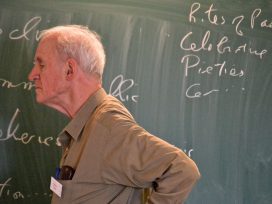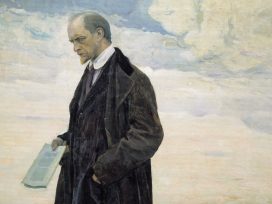Jeans and Veils
In the middle of Bascarsija, Sarajevo¹s old town, right on the stairs of the old well amongst the pigeons, an old woman is taking off her skirt, her blouse, her shoes, and finally her brassiere ad her panties. The shop-owners in the neighbourhood turn their heads away, staring at the sky. Nobody wants to look at the naked old lady. “There are a lot of them now” says one man with a dry voice. Crazy people. The inhabitants of Sarajevo have become used to them since the war with Serbia.
When I lost my mother I felt that I had begin to believe in something just to survive” says Sanela, 26, an Economics student at Sarajevo¹s university. It was in the second month of the war when the whole family was just sitting in the dining room and a missile pierced the wall, hit and wounded her younger brother and killed her mother. “I was only 18 years old, my father was working in Germany and I was alone with my younger sisters and brothers” Sanela says. She was helped by an old doctor working for a religious association who smuggled them out of Sarajevo. Six months later he died of cancer. “The death of my mother, the war, the old doctor… all these influenced me and I became more religious” says Sanela. “But my husband, who is working as a computer technician for the European Union, also told me: ‘you have chosen the way of religion so you should do what Islam wants you to do’.”
Sanela is one of those young Bosnian women who have decided to wear an Islamic headscarf. Before the war with Serbia only few women in Bosnia wore the scarf – a few girls from the Medresa (Coranic school), and some old women in villages. The scarf was not openly forbidden, although it was not allowed at school and the head was also not allowed to be covered on identity photos. Religion did not play an important part back then. Traditional cakes on Islamic holidays – that was nearly the whole extent of Islam in Bosnia. After the war a religious infrastructure gradually appeared. In the old city, the souvenir shop turned into a shop for Islamic dress for women. Stores specialising in religious articles have been opened – you can buy compasses pointing in the direction of Mecca and alarm clocks waking you up with the call ‘Allah Akbar¹ – God is great. All goods are imported form Arab countries, so they are more expensive. Books about the way of life as prescribed by Muhammed have appeared and in the villages a brochure describing the Islamic wedding night is very popular. “Before the war, people would like to give their newborn babies names which did not show their religious origins, like Vera or Zlatko. Now names like Ahmad or Muhammed are very popular in Muslim communities”, says a foreign observer. The old forgotten Turkish words are returning to the language and some people have begun using the Arabic greeting ‘Salam alaikum¹. These changes especially affect the young generation of Bosnian Muslims.
“It happens that mothers wear mini skirts and their daughters – the veil” reports Edina Keameica a journalist specialising in social problems.
One foreign observer explains: “People think: the Serbs wanted to kill us because we are Muslims, so we will show ourselves as Muslims.” “We were dying here and Europe did nothing…”, Almedina, a middle aged woman from the Muslim Youth Association, tries to explain why Bosnians turn to Islam. Azra wears a Moroccan dress embroidered with golden thread. Her eyes are grey, her skin pale, her face typically Slavic. But every time she leaves her home, she wears a dark coat, black socks, black gloves, and she covers her head and her face with the black veil. “Black is good” Azra says, because it doesn¹t catch the attention of men. It is like you are invisible in the street.” At the beginning of the war she married a Moroccan man and left for Morocco. She has now returned to Bosnia and they are now living with their two children in a village called Bocinia. Before the war the village was Serb. The partly destroyed orthodox church on the top of the hill is the only remainder from that time. Now the Mujahedeen – foreign fighters who came from Bosnia from Arab countries during the war – live there.
Noon. There are only men and children outside the houses. The men have heavy beards and wear Afghan clothes. The central square is occupied by the new mosque and a long building with green curtains in the windows and a green flag at the door. Recitations of the verses of the Koran come out from inside – only men¹s voices.
Along the main street every few meters there is big orange barrel, unusual in other villages, and the announcements say ‘Be clean’. While one shop is only for women, two others are open to everybody, but the notice on the door warns: ‘Sisters are requested to wear Islamic dress’. There are two doctors in the village – a man for the men and a woman for the women. Azra is very busy with her new house and the two children but twice a week she meets with other women of the village to recite the Koran. The emir of the village, Ejman Abu Abdulrrahman, came to Bosnia form Syria before the war to study medicine. He, like other Mujehedeens, married a Bosnian woman, which allowed him to stay in Bocinia. Today he and other villagers are a little solemn They are waiting for guests from Western Europe and the United States invited to join a Muslim Summer Camp here. “Sisters, I will find accommodation for you”, he addresses this gentle invitation to my guides and me thinking that we came for the camp. But the emir refuses to talk to journalists. He even asked the local police to check our passports. “Why do you bother them?” the policeman asks harshly. “They are only living according to the prescription of the Koran!” “It is not within Bosnian Tradition to dismiss guests like that!”, Meliha, 22, is nearly crying. “The emir told me to go and never come back. How can he, an Arab, tell me that in my own country? He said that he represents the real Islam. But that is not Bosnian Islam!”
Meliha came from Bosnia only for a holiday from the US, where she has been living with her family since the beginning of the war. Thanks to a scholarship she obtained as an excellent student, she was able to enter a Washington University to study biology. Coming from a religious family she used to practice Islam. But she only started wearing the veil in Washington: “I felt alone. I was afraid of this world. You meet a boy and the next day he wants to go to bed with you. Wearing the scarf I feel more secure. Nobody proposes these things to me now.” But Meliha couldn¹t understand the advice of the Muslims coming form Arab countries “They used to tell us: You should do this or that, for example: Men’s trousers should end at the ankle. But my love for God doesn¹t depend on the length of my trousers!”
Muslims from Arab countries were usually surprised at Bosnian Islam. It is more private, less strict, much more relaxed, much more European. In the crowd walking up and down Farhadija Street in the centre of Sarajevo, you will notice women with very colourful scarves or others with regular Islamic scarves who wear denim. That is unusual in Arab countries. But the majority of women from Sarajevo don¹t wear a scarf at all. They wear short skirts, short-sleeved blouses and don’t care a lot about Islam. At least they don¹t seem to care about it. “For us, Islam is only a tradition” Senka Kurtovic, a journalist, says. “Young girls wearing headscarves are not form here, not from Sarajevo. They are from small villages…” But another journalist from the same newspaper told me: “People know nothing about marriage in the Koran. It also has a lot of good aspects. There is such a lot of pressure. If there wasn¹t, I would wear the veil”.
Fatima used to work as a bookkeeper in an important company in Sarajevo. After her company had been destroyed by bombs she decided to open a guest house. She is about 40 years old, doesn¹t go to the mosque, doesn¹t pray, and doesn¹t like girls wearing the veil, but the day she opened the hotel she bought a huge photo of Mecca and nailed it to the middle of the wall. I don¹t know if she did it for herself or for her clients. But in any case it shows that in Bosnia, Islam now means something more than traditional cake on Islamic holidays.
Published 17 July 2000
Original in English
First published by IWM Newsletter
Contributed by Transit © Danuta Beata Pawlak / Transit / Eurozine
PDF/PRINTNewsletter
Subscribe to know what’s worth thinking about.




